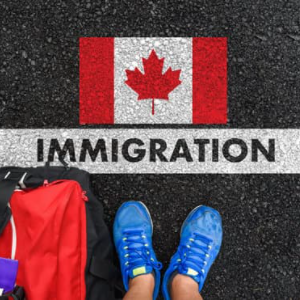Immigration to Canada: How to sponsor a child

Sponsoring a child to Canada is a generous and engaging process that allows a child to live and grow up in a safe and stable environment. Whether you are a Canadian resident wishing to sponsor a child from abroad, or a Canadian citizen wishing to sponsor a child from your family abroad, this article will guide you through the process of sponsoring children to become permanent residents of Canada.
Who can sponsor a child in Canada?
According to Immigration, Refugees and Citizenship Canada (IRCC), to sponsor a child to immigrate to Canada, you must be a Canadian citizen, a permanent resident of Canada or a person registered in Canada as an Indian under the Indian Act of Canada, at least 18 years of age, and a resident of Canada. In addition, you must be able to prove that you can financially support the child you wish to sponsor.
What are the child's eligibility criteria?
To be eligible for sponsorship, a child must be under 22 years of age and not married or in a common-law relationship. However, there are exceptions for children who are financially dependent on their parents due to a physical or mental disability.
How do I start the sponsorship process?
The process of sponsoring a child to Canada involves several steps. First, you must prove your eligibility as a sponsor. This usually involves providing financial documents and proof of your status in Canada. Next, you must submit a sponsorship application, an application for permanent residence on behalf of the child, and pay the processing fees.
What documents are required?
Several documents are required to sponsor a child in Canada. You'll need a birth certificate for the child, proof of your relationship with the child, and documents attesting to your financial capacity. The child will also need a valid passport, a medical examination, and possibly other documents depending on the country of residence.
How long does it take?
Processing time can vary considerably depending on several factors, including the child's country of origin and the number of applications received by IRCC. In general, you should allow at least 12 to 24 months for the entire process.
How much does sponsorship cost?
The cost of sponsoring a child to Canada includes a processing fee that must be paid to IRCC. Fees may vary, but in 2023, they generally amount to approximately 150 CAD to independently sponsor a dependent child, including sponsorship fees (75 $) and processing fees (75 $).
Sponsoring a child in Canada is a process that requires time, financial resources and careful planning. However, with patience and a good understanding of the process, it is entirely possible to give a new start to a child in need. Be sure to visit the IRCC website for up-to-date and detailed information on the sponsorship process.
Mistakes to avoid in the sponsorship process
Like any bureaucratic process, sponsoring a child in Canada can be complex and fraught with potential pitfalls. A common mistake is submitting incomplete or incorrect documents. Be sure to double-check all required documents and provide all requested details.
It's also essential to keep a close eye on deadlines. Late submission of documents can result in a delay in the sponsorship process, or even a refusal.
The benefits of sponsoring a child
Despite the potential challenges, sponsoring a child in Canada offers many advantages. For the child, it can mean a fresh start, access to a quality education, and the opportunity to grow up in a safe and secure environment. For the sponsor, it can provide a rewarding experience and the satisfaction of making a difference in a child's life.
Sponsoring a refugee child
In addition to sponsoring a child through the family sponsorship system, there are also programs for sponsoring refugee children. These programs enable individuals and groups to sponsor children who have been displaced by conflict or persecution. These children are often in urgent need of security and stability, and sponsorship can play a vital role in meeting these needs.
Resources to help with the sponsorship process
There are many resources available to help those wishing to sponsor a child in Canada. The IRCC website is an excellent starting point, offering detailed guides and up-to-date information on the sponsorship process. In addition, there are many non-profit organizations that provide advice and support to potential sponsors.
Sponsor eligibility criteria
Becoming a sponsor is a significant responsibility. For this reason, Immigration, Refugees and Citizenship Canada (IRCC) has defined specific criteria to ensure that sponsors are suitable and ready to take on these obligations. Here are the main eligibility criteria for a sponsor in Canada.
Status and residence
To sponsor a child, you must be a Canadian citizen or permanent resident of Canada. In addition, you must be residing in Canada when you apply to sponsor, and plan to continue residing in Canada once the sponsored person becomes a permanent resident.
Age
Sponsors must be at least 18 years old to be eligible. This requirement is designed to ensure that sponsors have the maturity and stability needed to support a child.
Financial capacity
A crucial criterion for sponsorship is financial capacity. As a sponsor, you must demonstrate that you are financially capable of supporting the child you wish to sponsor. This means that you must be able to provide for the child's basic needs, such as food, clothing and accommodation. To prove your financial capacity, you may need to provide documents such as tax returns or pay slips.
No outstanding bankruptcies
If you are currently in a state of unpaid bankruptcy, you cannot sponsor a child to Canada. You must have settled the bankruptcy before you can submit a sponsorship application.
No order to leave Canada
If you have been ordered to leave Canada, you cannot sponsor a child. You must resolve your immigration situation before you can submit a sponsorship application.
No criminal record
Certain criminal convictions may prevent you from sponsoring a child. If you have been convicted of certain offenses, particularly those related to violence or sexual offenses, you may not be eligible to sponsor.
It is important to note that these criteria are subject to change, and it is always best to consult the IRCC website or seek the advice of an immigration expert for the most up-to-date and accurate information. Becoming a sponsor is a significant responsibility and should be taken seriously. Make sure you fully understand the eligibility criteria and your obligations as a sponsor before you begin the sponsorship process.
Eligibility criteria for the child to be sponsored
For your application to sponsor a child to be accepted by Immigration, Refugees and Citizenship Canada (IRCC), the child you wish to sponsor must meet certain eligibility criteria. Here are the essential criteria that the child must meet.
Age and marital status
To be eligible for sponsorship, the child must be under 22 years of age at the time of application, and must not be married or in a common-law relationship. If the child is 22 or over, he or she may still be eligible if financially dependent on his or her parents for support and unable to support himself or herself due to a physical or mental condition.
Relationship with the sponsor
The child you wish to sponsor must be your biological or adopted child. In the case of an adopted child, the adoption must have taken place before the child reached the age of 18.
Health and criminal history
As with all immigration applications, the child you wish to sponsor must undergo a medical examination to prove that he or she does not suffer from an illness that could represent an excessive burden on Canadian health services. The child must also have no criminal record.
Financial dependence
To be eligible for sponsorship, the child must be financially dependent on you, the sponsor. This means that the child is unable to provide for his or her own needs, and is dependent on you for such things as food, housing and medical care.
It is important to note that these criteria are subject to change and that each case is examined individually. If you have any questions about the eligibility of the child you wish to sponsor, it would be beneficial to consult an immigration expert or visit the IRCC website for up-to-date information. Sponsoring a child is an important decision, and it's crucial to understand all the requirements and obligations before starting the process.
Sponsorship of biological children in Canada
If you are a Canadian citizen or permanent resident and would like to sponsor your biological child to come and live with you in Canada, the process is relatively straightforward, although there are some conditions that must be met.
Parent-child relationship
One of the first steps in the sponsorship process is to prove the parent-child relationship. In the case of a biological child, this can usually be done by providing an official birth certificate stating that you are the child's parent. It may also be necessary to provide other documents to prove that you have maintained a relationship with your child if you have lived apart.
Custody rights
Custody issues can also be an important factor in the sponsorship process. If you share custody of your child with another parent or guardian, you will need to obtain their consent for the child to immigrate to Canada. This may involve providing legal documents such as custody agreements or divorce papers.
Continuing the sponsorship process
Once you have proven your relationship with the child and resolved all custody issues, you can proceed with the sponsorship process. This includes submitting a sponsorship application, paying the processing fee, and providing additional documents, such as proof of your citizenship or permanent resident status and financial ability.
Sponsorship of adult biological children
Please note that sponsoring an adult biological child (aged 22 or over) is possible, but only if the child is financially dependent on you due to a physical or mental incapacity. In such cases, you will need to provide medical documentation to prove the child's incapacity.
Sponsoring your biological child to live with you in Canada is a great opportunity for family reunification. However, it's essential to understand and follow the process carefully to ensure a smooth transition for you and your child.
Sponsorship of adopted children in Canada
If you are a Canadian citizen or permanent resident and have adopted a child or are planning to adopt a child from abroad, you can sponsor him or her to come and live with you in Canada. However, the sponsorship process for adopted children involves several steps and can be complex. Here's what you need to know.
Proof of adoption
First, you'll need to prove that the adoption is legal and meets the requirements of Canadian law and the law of the country where the adoption took place. You'll need to provide official proof of the adoption, such as an adoption certificate.
Adoption in the best interests of the child
For an adoption to be recognized for immigration purposes, it must be in the best interests of the child. This means that the adoption must respect the rights of the child, and that the child's well-being must be the primary consideration.
Adoption process
The adoption process must have been completed correctly. For an international adoption, this generally means that the adoption must be complete before the child arrives in Canada. In some cases, you can sponsor a child who has not yet been adopted, but you will need to prove that you intend to adopt the child once he or she is in Canada.
Adoption and legal custody
It's important to note that having legal custody of a child does not necessarily mean you can sponsor him or her. To sponsor a child, you must have adopted the child or have the clear intention of doing so.
Age and dependency issues
As with all sponsored children, the child you adopt must be under 22 years of age and not married or in a common-law relationship. If the child is 22 or over, he or she must be financially dependent on you due to a physical or mental disability.
Sponsoring an adopted child in Canada is a great way to give a child a fresh start. However, the process can be complex and requires a clear understanding of the rules and regulations. It's always a good idea to enlist the help of an immigration expert or adoption lawyer to help you through the process.
Conclusion
Sponsoring a child in Canada is an important decision that can have a significant impact on the lives of both the child and the sponsor. With the right preparation and a clear understanding of the process, sponsorship can be an incredibly rewarding experience. If you're considering sponsoring a child, take the time to learn about the process and prepare yourself for this important responsibility.
This article has been designed to be optimized for SEO, focusing on key terms such as "sponsorship", "child", "Canada", "process" and "guide". By using these terms consistently and relevantly throughout the text, we hope to improve its visibility on search engines for people looking to find out more about sponsoring a child in Canada.






